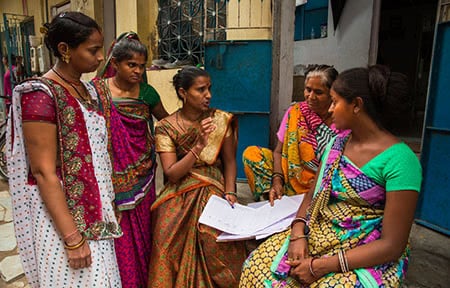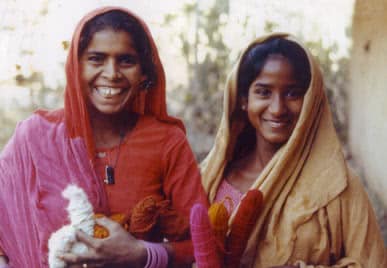Most women informal workers face triple barriers to economic empowerment:
- as women, due to gender norms and relationships;
- as workers, due to their often informal status; and
- as members of disadvantaged communities, who often live in underserved slum and squatter settlements.

Bias and Barriers
While informal workers represent a majority in developing countries, most supports, social protection, laws and policies are biased towards formal workers and formal enterprises. These include sectoral policies, infrastructure services, social protection, child care and occupational health and safety systems. Add to this a long-standing bias in institutions for collective bargaining, policymaking and rule-setting.
To overcome these structural barriers, WIEGO emphasizes that women informal workers need to be organized and their organizations need to be legally recognized and officially represented in collective bargaining, policy-making and rule-setting processes.
WIEGO's Approach to Women's Economic Empowerment
Through our work with membership-based organizations, we have learned that increased access to resources without the ability to influence broader external factors will not necessarily translate into more secure and remunerative livelihoods.
For WIEGO, empowerment refers to the process of change that gives working poor women – as individual workers and as members of worker organizations – the ability to gain access to the resources they need while also gaining the ability to influence the wider policy, regulatory, and institutional environment that shapes their livelihoods and lives.
Read WIEGO’s position and approach to women’s economic empowerment.
What WIEGO Does
WIEGO seeks to advance the economic empowerment of women in the informal economy through five core programmes that work to:
Increase Voice by supporting and strengthening organizations of the working poor and linking organizations together. We also help them gain representation in the policymaking and rule-setting bodies that affect their work and lives.
Increase Visibility by undertaking or sponsoring research and helping to develop and improve official statistics on informal employment and the informal economy.
Increase Validity by promoting the mainstream recognition of informal workers as legitimate economic agents who contribute to the overall economy and who should benefit from economic and social policies. We also advance the incorporation of informal workers into policymaking and rule-setting processes.
WIEGO works principally with four occupational groups of informal workers where women are over-represented among the lower earners: domestic workers, home-based workers, waste pickers and street vendors. WIEGO engages with membership-based organizations (MBOs) of these workers in advocacy and action from the municipal to the international level.
Global Advocacy
- Because child care is a key factor in women's economic empowerment, WIEGO has launched a global Child Care Campaign.
- WIEGO works to ensure that the voices of informal workers, and the visibility of their challenges, are represented in global agenda-setting processes.
- In 2016-17, the WIEGO network played a key role in the UN High-Level Panel on Women's Economic Empowerment.
- In 2018, WIEGO Senior Advisor Marty Chen spoke to Oxfam Canada, the IDRC and Global Affairs Canada about the importance of an intersectionality approach to women's economic empowerment. See her presentation. This approach is reflected, in part, in the Oxfam Canada publication "A Feminist Approach to Women’s Economic Empowerment: How Canada Can Lead on Addressing the Neglected Area’s of WEE."
WIEGO Projects that Focused on Women's Economic Empowerment
While all of WIEGO's work seeks to improve the economic circumstances of women working in the informal economy, these projects have a particular focus on women's economic empowerment.
 Promoting Women's Economic Empowerment
Promoting Women's Economic Empowerment
(2009-2012)
This project received support from the Government of the Netherlands, Ministry of Foreign Affairs
 Securing Economic Rights for Informal Women Workers
Securing Economic Rights for Informal Women Workers
(2012-2015)
This project received support from the Government of the Netherlands, Ministry of Foreign Affairs
(2011-2015)
The Gender & Waste Project in Minas Gerais, Brazil, was initiated to bring gender consciousness to the forefront of the discussion among waste pickers.

 Waste & Gender
Waste & Gender